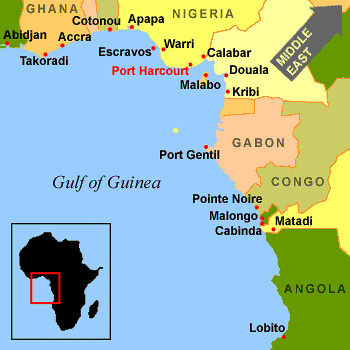
A map of the Gulf of Guinea off the coast of West Africa. There have been US military maneuvers in this region amid reports of so-called 'piracy attacks' of ships., a photo by Pan-African News Wire File Photos on Flickr.
Nigeria, others begin special military exercise in Gulf of Guinea
Tuesday, 21 February 2012 00:00 From Madu Onuorah, Calabar News
Nigerian Guardian
A FOUR-DAY international maritime military exercise codenamed Obangame Express 2012 began in the Gulf of Guinea yesterday.
The exercise, which is being hosted by Nigeria through the Eastern Naval Command of the Nigerian Navy, is being attended by 12 nations: Nigeria, United States, France, Italy, Spain, Cameroun, Ghana, Gabon, Equatorial Guinea, Sao Tome & Principe, Togo, Benin Republic and Republic of Congo.
Four warships from the Nigerian Navy have been designated to be part of the exercise while the participating nations are expected to deploy their own warships or observers. In addition to the warships, the Nigerian Navy will also deploy its helicopters while the Nigerian Air Force is to deploy a Maritime Patrol Aircraft (MPA). Some other Nigerian Navy warships would be deployed near the Exercise Obangame area and are to interject when required.
Flag Officer Commanding (FOC) Eastern Naval Command, Rear Admiral Usman Jibrin told journalists in Calabar yesterday that the “Obangame Express is a maritime interdiction exercise based on simulated scenarios of the most prevalent international crimes at sea.
"It is aimed at enhancing the response capabilities of the Navies in the Gulf of Guinea. It is designed to encourage countries in the region to improve on interoperability of communications and sharing maritime domain awareness information with a view to harnessing their collective efforts to combat piracy, human trafficking and other sea-based crimes.”
According to him, “the strategic objectives of the exercise is to ensure maritime safety and security through international military partnerships while developing trained and motivated maritime professionals. West and Central African nations can improve international investment significantly if they cooperate to protect oil reserves and shipping lanes.”
The Gulf of Guinea runs from Guinea on Africa’s North Western tip to Angola in the South. Though piracy in the Gulf of Guinea is not on the scale of that off Somalia, analysts say an increase in scope and number of attacks in a region ill-equipped to counter the threat could affect shipping and investment.
Admiral Jibrin, who is the chairman of the Obangame Express Local Organising Committee, expressed regret that “pervasive insecurity in this resource-laden maritime environment has resulted in more than $2 billion in annual financial losses, significantly constrained investment and economic prospects, growing crimes and potentially adverse political consequences.”
He noted that the Gulf of Guinea maritime environment has been increasingly threatened by myriad of security challenges such as piracy, poaching, smuggling, oil theft, trafficking and other transnational crimes.
“The challenges posed by sea-based crimes are such that no single nation is capable of effectively combating them all alone. The situation thus calls for synergy of efforts amongst maritime nations towards ensuring a safe and secured maritime environment.”
No comments:
Post a Comment